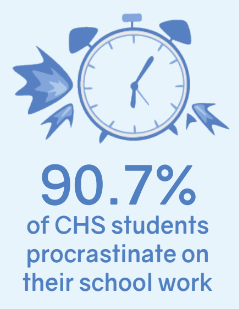CHS procrastinates: students lose sleep

BLOT GRAPHICS BY Z. SABRINA LIDING, CINDY LIN, JANELL GUI and TIMOTHY WILBURN
Survey of 54 CHS Students from Oct. 13 to Oct. 21.
November 23, 2022
Procrastination among students has become a prevalent issue, heightened by the rise of distractions from online social platforms. From TikTok to YouTube, social media platforms have been shown to provide temporary stimulation that hinders students’ abilities to focus.
According to Merriam Webster, procrastination is the intentional act of putting off doing something that should be done. It affects people of all age groups, especially teens. Whether it’s regarding homework, studying or even household chores, most students have had some point in their life where ‘“just 10 more minutes” of social media turned into much more.
The Huntington News conducted a study with the app Stop Procrastinating and found that out of 1,500 U.S. undergraduate students, 51% lost up to at least an hour of productivity a day due to social media and internet distractions.
In addition to distracting students from their schoolwork, social media apps and procrastination can significantly impact students’ physical and mental well-being.
Timothy Pychyl, a professor who studies procrastination at Carleton University, said, “Most psychologists see procrastination as a kind of avoidance behavior, a coping mechanism gone awry in which people ‘give in to feel good.’”
Essentially, people start procrastinating because they have anxiety, or simply are dreading the task they’re supposed to do.
Sophomore Lindsay Gilbert of Wall Township tries to minimize procrastination, as she participates in extracurriculars and does not want her workload to pile up.
“Social media and watching Netflix are the top two things I do when I do not want to do my work. I feel like it really puts me behind, which is why I don’t do it so much,” Gilbert said. “I play sports outside of school and try to get my homework done because my time is limited.”
According to BMC Psychology, social networking addiction has a negative impact on academic achievement by creating academic procrastination, increasing academic stress and reducing sleep quality. The New York Times reports that the momentary relief people feel when procrastinating is actually what makes the cycle so vicious.
Junior Brenna Furniss of Belmar spoke regarding the continuous cycle of procrastination, being one of the countless teens who procrastinates and is then affected by the consequences.
“Usually when I procrastinate, I go on TikTok and YouTube. I take naps after school to stay up late at night to then finish my work,” Furniss said. “I think procrastination affects my life severely since I’m extremely tired the next day and have a hard time focusing.”
According to a study published by ScienceDirect, procrastination is associated with shorter sleep duration and worse overall sleep quality. The results suggest that managing procrastination will help students to improve their sleep health.
Sophomore Molly McCarthy of Manasquan said, “Although I do always complete my work even if I procrastinate, I ended up falling into the habit of getting less sleep and pushing off the things I do not like to do, which can affect
my sleep in the long run.”




